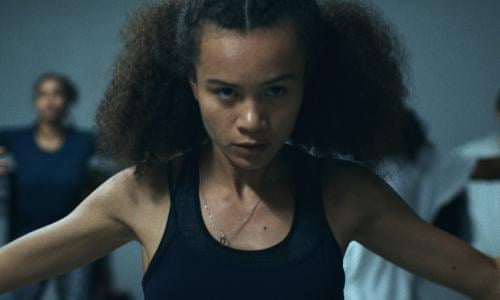The Weight of Silence: A Review of Aneil Karia’s Work
Author: Appenteng Hayford
Published: 22/06/2025
https://youtu.be/nkqgjsMDYho?si=GHxWFnddLJhabAsy
In Aneil Karia’s BAFTA-winning short Work, we follow a young woman through a day that looks ordinary on the surface but reveals itself as a quiet emotional storm. With barely a word, the film explores the hidden weight of emotional labor, social pressure, and the toll of self-restraint. A must-watch short that speaks volumes in silence.
Work is a quiet but powerful short film that follows Jess, a young Black woman, through what seems like a typical day. But right from the start, there’s a simmering tension. Her interactions at work, on the street, at home are loaded with emotional pressure, even when they appear casual.
There are no dramatic plot twists, yet the film grips you by building psychological intensity through small, real-life moments. Jess isn’t in physical danger but her mental and emotional space feels increasingly suffocating.
At its heart, Work is about the emotional labor of existing in spaces that don’t fully accept or understand you. It’s about holding everything in, staying composed, and the deep cost of constantly managing your identity just to make it through the day.
Jasmine Breinburg’s performance as Jess is the emotional anchor of the film. With very little dialogue, she manages to convey exhaustion, anxiety, and deep restraint. Her eyes and body language tell us everything we need to know no words necessary.
Jess feels real because she is real: someone you may have worked with, passed on the street, or known personally. The supporting characters aren’t deeply fleshed out, but that’s intentional they represent the environments Jess must navigate, rather than relationships she relies on
The camera sticks close to Jess tight, handheld, and often from behind or over the shoulder. This creates a feeling of claustrophobia, mirroring how trapped she feels.
The lighting is mostly natural, with muted colors that ground the film in realism. The final scene, however, shifts the lighting becomes harsher, the camera more kinetic, amplifying Jess’s emotional release.
It’s not a showy film visually, but it’s incredibly thoughtful. Every shot feels purposeful.
Sound is used sparingly but smartly. There’s no score guiding your emotions. Instead, the film relies on ambient sounds office noise, footsteps, distant chatter to immerse us in Jess’s world.
And when the music finally arrives during the explosive dance sequence it hits hard. It’s not just a beat; it’s emotional release through rhythm. The contrast between the film’s silence and the final soundscape makes the ending even more powerful.
Work doesn’t shout. It whispers, holds tension, and then finally lets go. It’s a film that respects your emotional intelligence and rewards careful attention.
Its biggest strength lies in its honesty and restraint. It tells the truth about the emotional weight of performing “okay-ness” in a world that doesn’t always feel safe or welcoming.
It may feel unresolved to some but that’s the point. There is no quick resolution to this kind of experience.
At under 15 minutes, it says more than many full-length features. It’s thoughtful, powerful, and socially relevant.
Jess simply wants peace. Beneath that, she wants emotional safety the ability to exist without having to perform for others.
The pressure to conform and suppress emotion. It shows up through coworkers, strangers, and even family. Its goal is to keep Jess small, quiet, “manageable.”
Jess is in constant conflict with her environment. Every space expects her to show up in a certain way cheerful, composed, polite no matter what she’s feeling inside.
The climax happens during her dance class, where Jess breaks away from the choreographed routine. Her solo movement becomes a raw, emotional outburst a scream through the body.
There’s no neat ending. Jess doesn’t walk away with closure, but she walks away with a moment of emotional truth a break from the mask she’s worn all day.
Appenteng Hayford
is a passionate short film enthusiast dedicated to spotlighting meaningful storytelling in bite-sized cinema. Each week, they explore a new short film from hidden gems to award-winners one powerful review at a time.
Have you watched Work? Did Jess’s story resonate with you?
Drop your thoughts in the comments and if you have short film recommendations for next week, we’d love to hear them!
#unimac #DzoloKpuita #VisualStorytelling
#ShortFilmReview #WorkShortFilm #AneilKaria #BAFTAshorts
#FilmCriticism #BlackVoicesInFilm #EmotionalLabor #ShortOfTheWeek



Comments
Post a Comment